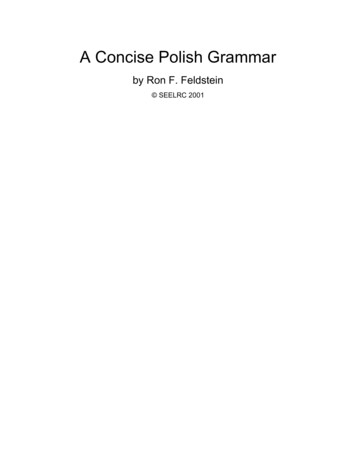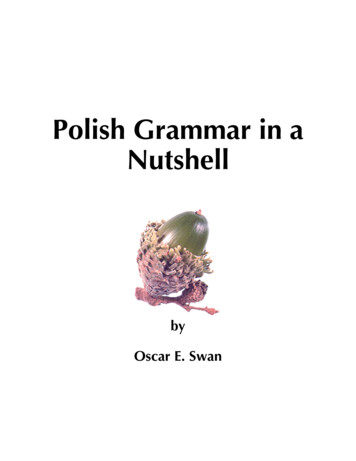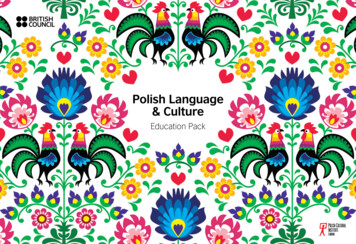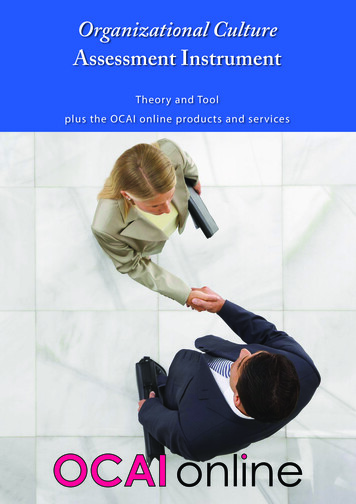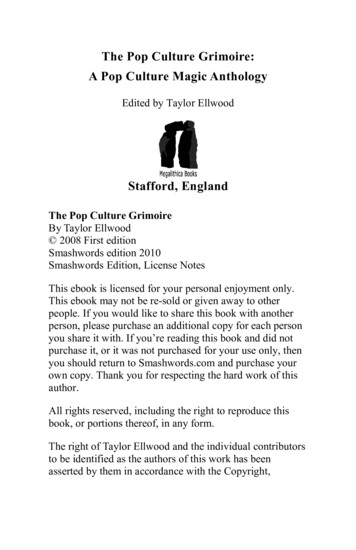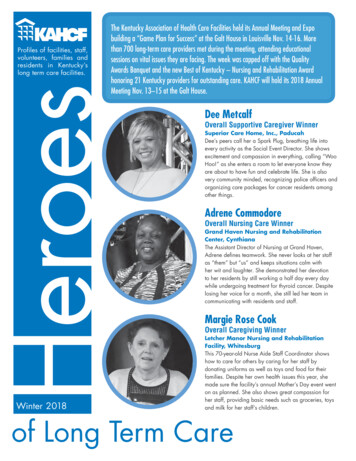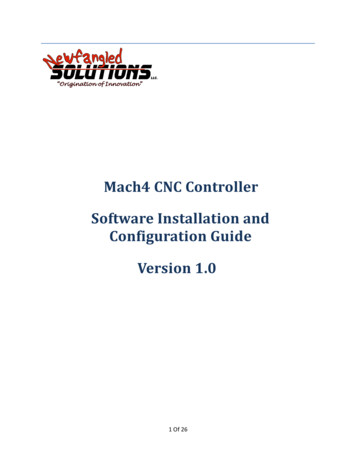
Transcription
PolishCULTURE PROFILE
Published 2006 by:DiversicarePO Box 5199West End, Queensland, 4101Phone: (07) 3846 1099Polish Culture ProfileThanks is given to the following people:Margaret Hess, Director, DiversicareElizabeth Zajac, Project Officer, PICAC and to all those persons who have providedcomment about this directory.Editor: Jennifer Leigh (J Leigh & Associates)DisclaimersThis directory is a synthesis of information from arange of sources believed to be reliable. Diversicaregives no warranty that the said base sources arecorrect, and accepts no responsibility for anyresultant errors contained herein or for decisionand actions taken as a result and any damage.Please note there may be costs associated withsome of the resources and services listed in thisprofile.
INTRODUCTION4BACKGROUNDMigration experienceAustralian statisticsCustoms in everyday lifeCultural stereotypes56667FAMILYFamily structureAttitudes to residential care888PERSONAL HYGIENEBathingDressGrooming9999PENSIONS10LEISURE AND RECREATIONDaily RoutineSocial 111111212121313RELIGIONProfileImportant days141415FOOD AND DIETMealsFood sources181819HEALTHTrauma situationsAttitudes to illness and painPerception of health professionals20202020DEATH AND DYINGPalliative careDeath & dying212121LANGUAGE22PHRASE CARDS23ADDITIONAL RESOURCES38CORRECTION / ADDITION FORM40
INTRODUCTIONThis profile of the Polish culturalcommunity is just one of the manyprojects undertaken by the QueenslandPartners in Culturally Appropriate Care(PICAC).a Polish background. It also seeks tofacilitate the professional competenceand development of staff in theprovision of culturally inclusive care; and the organisation’s compliance with theThe Queensland PICAC Project aims tofacilitate the development of partnershipsbetween ethnic community groups andresidential aged care service providers toimplement “best practice” strategies ofcare for older people from diversebackgrounds. The project is about ensuringthe needs of older people from a Polishcultural background are met.Funded by the Commonwealth Departmentof Health & Ageing, the project inQueensland is managed by Diversicareunder the auspice of the EthnicCommunities Council of Qld.Population trends within Australia areincreasingly characterised by a diversity ofpeople, languages and culture. Coupledwith this trend is an ageing population,also with a rich diversity of languages andcultures.It’s not surprising then, that residentialaged care service providers are faced withincreasing demands for culturallyresponsive facilities and care.This profile aims to assist by enhancing: staff knowledge of the cultural andlinguistically diverse needs of persons from4Residential Care Standards and NationalAged Care Standards as they pertain tothe issue of cultural and linguistic needs.The profile provides useful informationabout a range of topics, resourcesincluding books, articles, audio-video aids,services, and so on.This symbol is used to indicate a ‘tip’,which YOU, as the caregiver of aperson who was born in Poland, mayfind useful in your day-to-day supportof that person.In an effort to maintain the accuracy ofthis profile and improve its contents, forall stakeholders, we encourage readers tocomplete the feedback form on the lastpage to inform us of any inaccuracies orother resources available. It is consideredthat this feedback will assist us maintain auser relevant and quality resource.Yours SincerelyMargaret HessDirectorElizabeth ZajacPICAC Project Officer
BACKGROUNDThe Republic of Poland (or ‘Polska’) withWarsaw as its capital, covers 312.685 sqkilometres. It’s divided into sixteenprovinces (or ‘wojewodztwo’) Dolnoslaskie, Kujawsko-Pomorskie, Lodzkie,Lubelskie, Lubuskie, Malopolskie,Mazowieckie, Opolskie, Podkarpackie,Podlaskie, Pomorskie, Slaskie,Swietokrzyskie, Warminsko-Mazurskie,Wielkopolskie and Zachodniopomorskie.Located in Central Europe, sharing borderswith Germany, Czech Republic, Slovakia,Ukraine, Lithuania, Russia and Belarus,Poland is mostly flat plain with mountainsalong its southern border.5
Migration experienceMany Polish refugees came to Australiaafter World War II. their ancestry includes Polish (85.2%),Jewish (1.8%) and German (1.2%)(Source: Polish Community Information Summary,DIMIA 2001)From 1957-1966 emigration occurredfollowing relaxation of emigration laws bythe government of Poland.The emergence of the Solidarity tradeunion movement and declaration of martiallaw in Poland at the end of 1981 resultedin a third wave of emigration to Australia.During the period 1980 – 1991 Australiagranted permanent entry to more than25 000 Poland–born people, many arrivingas refugees.The improvement in living conditions inPoland and more stringent migrationcriteria has significantly reduced the levelsof Poland-born migration to Australia.(Source: Polish Community Information Summary,Within Queensland, individuals born inPoland and aged 60 years represent some779 individuals.Due to the length of time in Australia,Poland-born persons have a wellestablished network of services andactivities (eg Polish Clubs) in most Statesof Australia and key regional centres ineach State.The above data means the Polandborn person you are caring for ismost likely to have been welleducated, have worked in a skilled joboutside the home and been part ofestablished social and recreationallinks to other Poland-born persons.DIMIA 2003)Customs in everyday lifeAustralian statisticsAs at 2001 Census, 58,070 Poland-bornpersons have settled in all AustralianStates, with 5,240 Poland-born peopleresident in Queensland.Of the total Poland-born population inAustralia (2001 Census): 38.4% are aged over 65 years; 54.3% have either a trade or tertiaryqualification; 57.2% were employed in a skilledoccupation, 25.9 % in semi-skilled and16.9% in unskilled jobs; and females comprised 53.1% and males46.9% ; and6Formal manners are important to Polandborn aged persons.Greetings. People from Poland, can bequite formal with strangers with politenessat the initial contact being greatly valued.A handshake is the most common form ofgreeting upon meeting or leaving andapplies almost every time they meet. Inmixed company, a women’s hand is shakenbefore the males’, with an older women’shand shaken before a younger woman’shand. The aged Poland-born grew up in atime when it was also customary for a manto kiss the lady’s hand.
Poland-born people enjoy greeting eachother, sometimes exchanging embraces ora ‘kissed’ greeting which is a delicatetouching of cheeks. This indicatesfamiliarity rather than love, with touchbeing the display of caring common amongfamily members and friends.The above customs are from a time inwhich the older generation lived andwere raised. They may not be evidentin the younger generations today –especially those people born after1960’s.Cultural stereotypesReferring to others. You shouldn’t usefirst names with people you don’t know oronly know a little. Most Poland-born peopleprefer the use of titles ‘Mrs’ (or ‘Pani’) and‘Mr’ (or ‘Pan’) followed by the Christianname or surname. Even worse is to callsomeone only by his or her surname.The dropping of titles such as Doctor,Professor is also taken as impolitebehaviour.The appropriate use of the person’s nameand appropriate titles is particularlyimportant where the person has dementiaand may have reverted to their culture oforigin naming protocols.Gestures. It is considered an insult topoint your index finger to one’s forehead.Entering a room. It is courteous to standwhen a women or the host enters a room.It is also considered good etiquette formales to open a door for females to letthem enter first.Attire. Sloppy or overly casual clothing isconsidered inappropriate in public.Taboos. It is not good etiquette to askfemales about their age (eg. ‘how old areyou?’). Also tact is needed when discussingWorld War II and political issues related tothe 1945 -1950s.Poland-born people are seen as easy going,helpful and very friendly. They are anexceptionally hospitable nation with an oldadage of ‘a guest in the home, God in thehome’, meaning a guest is to be offered allthe best things available. A guest in aPolish home is warmly welcomed and maybe overwhelmed by the outpouring ofgenerosity.For some Poland-born people, alcoholserves a culturally important function,particularly during social occasions, suchas name day, birthday, and New Yearcelebrations. Non- Poland-born people maysee the amount and strength of drinksconsumed at such occasions as excessive.Punctuality is also important to Polandborn people with lateness being a sign ofbad manners. Depending on the status ofthe person for whom they are waiting,Poland-born people may be intolerant oflateness in others. Even in socialsituations, people are expected to arrive ontime.Poland-born people as a group tend toshare thoughts and ideas freely and have akeen sense of humour. Most Poland-bornpeople enjoy a robust conversation, talkingof their jobs, politics, health problems andmisfortunes in the same way as Australianstalk about such things as football.7
Polish heritage is also associated with highculture in terms of theatre, literature, art,concerts, and opera.Whilst identifying as Polish, each personalso has a strong sense of regional culturalidentity. There are diverse cultural andsocial differences between the 16 provincesof Poland. The region in which the personlived will impact on the person’s preferences related to such things as festivals,food, drink, music, dance, clothing andlanguage dialect etc.It should be remembered this is justone view of Polish culture and doesnot apply to every Poland-bornperson. This reality means YOU shouldestablish each Poland-born person’spreferences.For more informationThe Poland-born community, CommunityInformation Summary, Department ofImmigration and Multicultural andIndigenous Affairs (DIMIA), 2006. Availableas a PDFhttp://www.immi.gov.au/statistics/stat info/comm summ/textversi.FAMILYFamily structureA successful family life is a very importantto Poland-born people. The father isgenerally the head of the family whereoften both parents work. The most popularfamily model is the 2 2 formula (mother,father and two children).Traditional family values and loyalty arestrong in most Polish households. Theelderly play an active role in helping adultchildren in their daily routine withfamilies. The extended family is also veryimportant, however many aged Polandborn persons do not have extended family.Attitudes to residential careResidential care is seen by elderly Polandborn people as the last option and otherin-home support programs will be accessedto prolong independence for as long aspossible. For many older Poland-bornpeople leaving home and moving intocommunal living arrangements isequivalent to losing their independence.It is traditionally expected that childrenwill look after their parents’ needs.However, Poland-born background peoplewho have lived in Australia for a numberof years may no longer have anexpectation of family involvement inhis/her care.8
However, as with any community,individual attitudes may vary, and someelderly may expect their offspring to takecare of them and therefore be unwilling toaccept placement in residential care.If you need help to provide culturallyappropriate care, the assistance of thePICAC Project Officer is available freeof charge to your agency or theresident. This service is restricted togreater metropolitan Brisbane andTownsville. For more information onPICAC contact Diversicare on(07) 3846 1099.PERSONAL HYGIENEThe routines and preferences surroundingthe following personal hygiene activitiesgreatly impact on the person’s sense ofself, pride, dignity and confidence.BathingWhilst there are no specific norms inbathing, most Poland-born persons want ashower daily, with some even preferring toshower twice a day.DressThere are cultural norms surroundingdress whereby sloppy or overly casualdress in public is seen as inappropriate.Clothing also needs to be in good repairand ironed.What is considered ‘appropriate’ dress isdetermined by the individual and will beinfluenced by the region in which he/shelived.GroomingPoland-born men and women look aftertheir personal appearance and areconcerned about how they look. Womenwill prefer to wear makeup, jewellery, nailpolish, perfume and have neat, wellgroomed hair. Men tend to usecologne/after shave, clipping nasal and earhair and trimming nails etc.It is important each person’s preferences related to their dress, bathing,grooming etc are established as partof their care plan.9
PENSIONSPeople who lived and paid taxes in othercountries are often eligible for a partialpension payment from that country.Australia doesn’t have a reciprocalarrangement in place with Polandregarding the payment of pensions.If you receive any foreign pension,Centrelink must be informed and yourAustralian supplement will be reducedaccording to the increased amount fromPoland. Failure to notify Centrelink canresult in a debt and fine being imposed.A Poland-born person can check his/hereligibility for any pension from Poland bycontacting the Embassy:Economic and Commercial OfficePolish Embassy10 Trelawney StreetSydney NSW 2025Ph (02) 9363 9821Fax (02) 9327 2216brhsydney@bigpond.com.auGeneral InformationEmbassy of Poland7 Turrana StreetCanberra/Yarralumla ACT 2600Ph (02) 6273 1208E-mail: ambpol@clover.com.auCheck your local telephone directoryfor your local Centrelink office.10LEISURE ANDRECREATIONTheatre, cinema and musical festivals arefavourite forms of leisure for the Polish,with visits to art galleries and museumsalso being popular.Soccer is extremely popular both as aspectator and participant sport withathletics and boxing also being popularspectator sports. Cycling is a traditionalleisure and sport pastime, as is walkingthe dog.Another popular “activity” is watchingtelevision (on average 4 hours a day) withvisiting shopping centres also becomingvery popular in Australia with ageingPoland-born persons. Poland-born personsalso enjoy drinks with colleagues andfriends plus sing songs etc.Many Poland-born people, even those whohave lived in cities, had an allotment ofland and enjoyed growing vegetables andflowers in their leisure time. Even a box orsome boxes in which to grow vegetablescan be very fulfilling to older Poland-bornpeople. It is also common to have pot plantand potted flowers inside the house (eggeraniums, marigolds, African violets etc).Older women often like to make preserves,jams, compotes, cakes and pastries.
The above information can assist indeveloping diversional therapyactivities eg tending potted flowersthat are kept in the person’s roomand/or a small box of vegetables keptin a communal area, and/or cookingcakes or pastries, etc. However, youneed to check with each individual hisor her preferences in regard torecreational activities.Kosciuszko Polish Assn of Darra23 Station Avenue, Darra Q 4076President: Ela AleksiukPh (07) 3282 5611Polish Ex-Servicemen’s Assn44 Holland Cr, Capalaba Q 4157President: Witold KuczynskiPh (07) 3823 1738Daily RoutinesAustralian Polish Assn andSeniorsOlder Poland-born persons like a routine(eg when she/he rises of retires, bathes,has meals etc) and generally have astructured pattern to the day, and likessticking to these times.PO Box 527, Pacific Fair Q 4218President: Mr Leon SkibaPh (07) 5502 0919Vice-President: Mrs Viesia HarlacePh (07) 5554 5765You need to establish with eachindividual his/her preferences relatedto his/her daily routine and timings.Social groupsThe Polish clubs in Brisbane andQueensland exist to provide communityfunctions, arts, information, welfare andsupport. Contact details are:’Polonia’ Polish Associationnof QldPresident: Mr Leszek WikariuszPh (07) 3389 0000Manager: Ms Grazyna Kornel10 Marie Street, Milton Q 4064Ph (07) 3369 2747Mobile 0412 122 209TelevisionThe SBS television network is available inmajor cities in Queensland. SBS providesPolish-speaking movies, programs or news.Polish news is available on Sunday 9.30amand Monday 12.30 noon.SBS television programming can bedownloaded from their website by going tothe following address:www.sbs.com.au/whatson/index.php3then choose what you are interested infrom the listed menu.In greater metropolitan Brisbane, alsocheck Briz31 programs, which can bedownloaded from their website by going tothe following address:http:/briz31.tv/news.aspPolish Seniors ClubPresident: Pawel SwiecickiPh (07) 3392 7290Check your TV program guide or thewebsites for local viewing time asthey may change in rural areas oracross time zones.11
MoviesSometimes Polish language DVDs areavailable at large Department stores (eg.Big W). It is important you check on theback of the DVD for the list of languages inwhich it is available.It is also possible to purchase Polishlanguage movies from the website by doinga search, eg: http://multilingualbooks.com/foreignvids.html-then go to show Google cache than go toQuick Link and press Polish.You can search the Brisbane City Councillibrary catalogue via its language collectionby going to the following website andchoosing the preferred language which willthen take you to a screen where you chooseyour category of interest (eg movies,books, music, 31L2U/44230061/1/1246/XBroadcasting in Polish language occurs on4EB FM98.1: Tuesday6.00pm – 6.45pm Thursday6.00pm – 7.00pm Sunday7.30am – 8.30amCheck the radio program guide or thewebsite for local listening times asthey may change in rural areas oracross time zones. For more, specificinformation you can contact Radio4EBFM – Polish Section:Ph (07) 3240 8600 Fax (07) 3240 8633NewspapersAs mentioned earlier, the province in whichthe person lived in Poland can affecthis/her preferred newspaper. There are atleast six sources to acquire a newspaper:1) A Polish language newspaper isavailable in Brisbane from Creek StreetNewsagent (Cnr Creek and ElizabethStreets, City) Ph (07) 3229 2888RadioBroadcasting in Polish language occurs onSBS – radio 1107AM Sydney Mondays1.00pm – 2.00pm1.00pm – 2.00pm Wednesdays Fridays1.00pm – 2.00pm Sundays1.00pm – 2.00pmIn greater metropolitan Brisbane, it is alsopossible to tune into 4EB (Fm 98.1) andtheir program guide can be downloadedfrom their website at the tm122) Go to the following web iewer.aspxand access a copy of followingnewspapers: Fakt Gazeta Wyborcza and INFO nurt 23) You can search on the web using thename of the publication. For example, thefollowing are available free from thewebsites: Dziennik Polskiwww.dziennik.krakow.pl/public Gazeta Krakowska www.gk.pl/ Zycie Warszawywww.zw.com.pl/apps/index.jsp
4) The following web address gives youaccess to another 11 Polish newspaperswhich you can rope/poland/5) You can contact “Krakus” in Sydney toorder some Polish magazines:Krakus - Shop 2, 7 Willan Dr CartwrightPhone/Fax (02) 9607 53946) Tygodnik PolskiPh (03) 9362 0128Fax (03) 9362 0108Email: polishweek@optusnet.com.auRedactor: Jozefa JaroszIf the person can’t use a computer,YOU can access the internet, loadthese newspapers and print all orsome pages which can then be givento the person to read at their leisure.BooksRegardless of your location in Queenslandit’s possible to arrange to have Polishlanguage books sent to your local libraryfor a small fee from the State Library ofQueensland. The State Library of Qld alsohas available Talking books in Polish.You can search State Library of Queenslandon: http://www.slq.qld.gov.auchoose catalogues then public libraryservices catalogue, then search by ‘anywords’ – then write in Polish(You also can look for Polish movies andmusic DVDs.)You can also search the Brisbane CityCouncil library catalogue via its languagecollection by going to the followingwebsite and choosing the preferredlanguage which will then take you to ascreen where you choose your category ofinterest (eg movies, books, music, A3lL2U/44230061/1/1246/XONLY for those persons who are visuallyimpaired and a member of the Qld BlindFoundation, it is possible to borrow fromits talking book library which has somePolish-language taped books. You will needto complete an application form, and ifapproved, borrowing rights then apply.Contact 1300 654 656 to obtain a referralform.MusicMusic is very important to Poland-bornpersons regardless of gender. It’s a strongcultural expression of who that person isand the region he/she lived in.The key thing to remember with music is alikely personal preference for music of theera in which they were teenagers or intheir twenties.You can find some Polish music CDs, atmusic stores at (eg Big W, Myers etc). Thelarger speciality music stores can alsoorder Polish music or you can purchasefrom their websites eg. Sanity’s webaddress allows you to search for Polishlanguage music and CDs. Their webaddress is: http://www.sanity.com.au13
You can search the Brisbane City Councillibrary catalogue via its language collectionby going to the following website andchoosing the preferred language which willthen take you to a screen where youchoose your category of interest (egmovies, books, music, A3lL2U/44230061/1/1246/X(Please note, a fee may apply fororganising inter-library loans.)Be sensitive to cultural and individualdifferences by establishing eachindividual’s preferences. Also checkwhether family members can assist infinding Polish language books, videos,DVDs CDs etc.RELIGIONProfileOf the total Poland-born population inAustralia the major religions are: Roman Catholics (75.0%) Judaism (6.6%) Lutheran (1.0%) and 5.7% stated “No Religion”(Polish Community Information Summary, DIMIA,2003)The daily life of Poland-born people isclosely linked with the Catholic Church,which has been strongly maintained inAustralia. Most Poland-born people belongto a church, even if they may in practicenot be regular attendees.In Brisbane, the Church of Our Lady ofVictories is a spiritual and educationalcentre, as well as a meeting place forgenerations of Polish-Australians.Sunday Mass is, for many Poland-bornelderly, a strict ritual. The Polish Mass iscelebrated on a regular basis in theBrisbane area: Bowen Hills Catholic Centre - everySaturday 6.00pm and every Sunday10.00am Darra Catholic Centre - every Sunday7.45am Woodridge Saint Paul – every Saturday7.30pm A Polish mass at Gold Coast area iscelebrating in Stella Maris Church at10.30am – every Sunday A Polish mass at Sunshine Coast area iscelebrating also in Stella Maris Church atMaroochydore – once per month 12.00.14
Churches where Poland-born peoplecan attend Polish Mass are:You need to establish each person’sreligious preferences and link him/herinto a local minister of that religion.Our Lady of Victories1 Roche Avenue, Bowen Hills Q 4006Parish Priests: Father Stan Wrona,Father Andrzej KolaczkowskiPh (07) 3252 2200Stella Maris268 Hedges AvenueBroadbeach Q 4218Father: Zbigniew PajdakPh (07) 5504 6297Important DaysThe following listing is not intended to beexhaustive; rather it lists the major shared‘special days’. You should check with theperson or his/her family if there are otherspecial days, which are important to thatperson.Stella Maris37 Baden Powell StreetMaroochydore Q 4558Father: BernardPh (07) 5475 4693Polish Catholic priests and Sistersvisit those residential facilities thatcare for people from a Polishbackground. Contact the abovechurches notifying the Church of anyPoland-born residents and visits willbe arranged.Remember there can also be a differencebetween nominating a particular religionto practicing that religion in ones’everyday life (or whether all or only somerituals/practices within that religion areobserved).Equally, just because a person when youngdid not practice or observe their religiondoesn’t mean as the person ages he/shemight now wish to practice.15
FestivityMonth / DateCustomary practicesLentLent lasts for 40 daysand finishes on GoodFridayA time of preparation for Easter. People may chooseto fast or not eat meat. People attend Mass regularlyand chasten themselves.Easter(Vielkanoc)Commences on PalmSunday – the Sundaybefore EasterTwigs of willow brunches are consecrated in churchand kept at home to protect against harm.Good Friday(Wielki Piatek)Friday before EasterDay of fasting – confession and communion areextremely important. No meat but hearings are eaten.People prepare for Easter (eg house cleaning, foodpreparation etc).Easter SaturdayContinuing preparation for Easter celebration.Children paint eggs. A little basket of food is takento church to be blessed (traditional Swiecenie –“sh-vee-en-tse-nee”). The traditional Easter symbolsinclude a small lamb made of sugar, butter, pastryor chocolate bunny and small pieces of the greenparts of the green box plant.Easter SundayCelebrated with candles, flowers and ringing ofChurch bells. People attend the special Easter Mass.After Mass the family eat a meal comprising traditionaleggs, yeast cakes (or “babka”), poppy seed cake,ham, vegetable salad, horseradish etc.Easter MondayPeople sprinkle each other with water in amountsthat range from a few drops to a bucket-full.40 days after EasterSundayPoland-born people attend church, celebrating aspecial Mass.Pentecost orHoly Spirit16
FestivityMonth / DateCustomary practicesCorpus Christi –Boze Cialo60 days after Easter(usually Thursday)This is a big holiday to Poland-born people. There isa Mass followed by a procession from outside thechurch. The elements of the procession are“stations”/altars - usually 4 altars are built,symbolising the 4 corners of the earth.Homes are decorated with the green branches takenfrom the procession and kept at home as “holybranches” bringing people happiness/luck andprotection.All Saint’s Day1st NovemberThis is a time of remembrance and prayers for thedead. Families will travel long distances to visit thegraves of relatives leaving flowers, wreaths andcandles.St Nicholas Day6th DecemberGiving of a small gift with a note on which is written“From Santa”.Christmas(BozeNarodzenie)Celebrated on 24 &25 DecemberFestivities begin on Christmas Eve, which is a timeof family gathering and reconciliation. Familiesdecorate the Christmas tree and put family giftsunder the tree.It is also customary to share a church-blessed wafer(oplatek), and wishes of happiness and prosperitybefore the evening meal (fish, hearings, beetroot orfish soup and/or dumplings with mushroom &sauerkraut). After supper, Christmas gifts are openedand carols sung. At midnight, the whole familyattends a special Mass (‘Pasterka’).25th DecemberThe family share a meal during breakfast containingham sausages and duck, goose or turkey. Dessertusually consists of poppy seed cake and gingerbread.31st DecemberParties are held and at midnight church bells ringand toasts are made to the new year (‘SzesliwegoNowego Roku’).New Year’s Eve(Silvester)17
FOOD AND DIETPolish cuisine is rich and very filling,consisting of soups, sauces and savourymeats that can be relatively high in fat.The typical Polish dietary staples are bread,potatoes, sausages, vegetables, fruit andmilk products.Supper Can consist of open sandwiches orFavoured ingredients that give Polish fooda distinctive taste include marjoram, dill,leaf parsley, wild mushrooms, sauerkraut,beetroot, cucumbers (dill cucumbers orgherkins) mushroom, eggs and carawayseeds etc.Poland-born people are happy to eat soups(eg. beetroot soup, barley soup, dill soup,pork tripe, chicken soup or vegetablesoup). Very popular are also dumplingswith meat, white cheese apples,strawberries or plums. Other favouritedishes include buckwheat groats, potatopancakes (which can be served forafternoon tea).Traditional Polish meal times (which differfrom the Australian timings) has evolvedfrom different working hours in Poland(7am – 3pm).MealsBreakfast Usually includes bread rolls, orbread, butter, scrambled or boiled eggs,cheese, sliced ham or sausage.Second breakfast Served aroundmorning tea time, it is usually sandwichesmade from rye bread topped with a varietyof fillings (eg: cheese, sausages, andhearings – with tomatoes, lettuce etc. plusblack tea or coffee.Lunch This is the main meal and is called“Obiad”, which is eaten early in theafternoon (usually 2-3pm). A normal Obiadwould consist of soup, the main courseand also dessert.18hot food like soup (especially in winter),dumplings or sandwiches with cold meats.On Fridays meat isn’t eaten instead itis replaced with fish.Some traditional Polish dishes include: bigos (a rich sauerkraut and meat baseddish) golabki (cabbage rolls with rice andmince meat) barszcz (beetroot soup), flaczki (tripesoup) mizeria (cucumber, dill and cream salad) nalesniki (pancakes) dried or stewed fruit compote a variety of yeast cakes and pastriesA variety of Polish recipes can be found bytyping the phrase ‘Polish food’ into anInternet search engine.It is important to establish each person’sfood preferences, cooking style (eg friedversus poached), quantity and timing ofmeals and recorded as part of their careplan.
BreadCheesesVegetablesMeat / FishFruitDrinksryesour doughwholemealand crustybread rollsa variety ofyellowcheeses andwhitecottagecheesepotatocabbagered chsausages,breaded porkcutlet,meatloaf,roasted lamb,beef cutlets,crumb orbattered fishapples,mandarinsorangesbananasteacoffeeherbal teamineralwaterfruit juicePoland-bornpeople liketheirvegetables wellcooked.For specialoccasionswine or beer,or for some,small glass ofvodka.Food sources“U Elzbiety”Below is a list of known suppliers of Polishfoods in South-East Qld. For those personsoutside of Brisbane, you could phone andsee if they can organize a d
families. The extended family is also very important, however many aged Poland-born persons do not have extended family. Attitudes to residential care Residential care is seen by elderly Poland-born people as the last option and other in-home support programs will be accessed to prolong independence for as long as possible. For many older .
